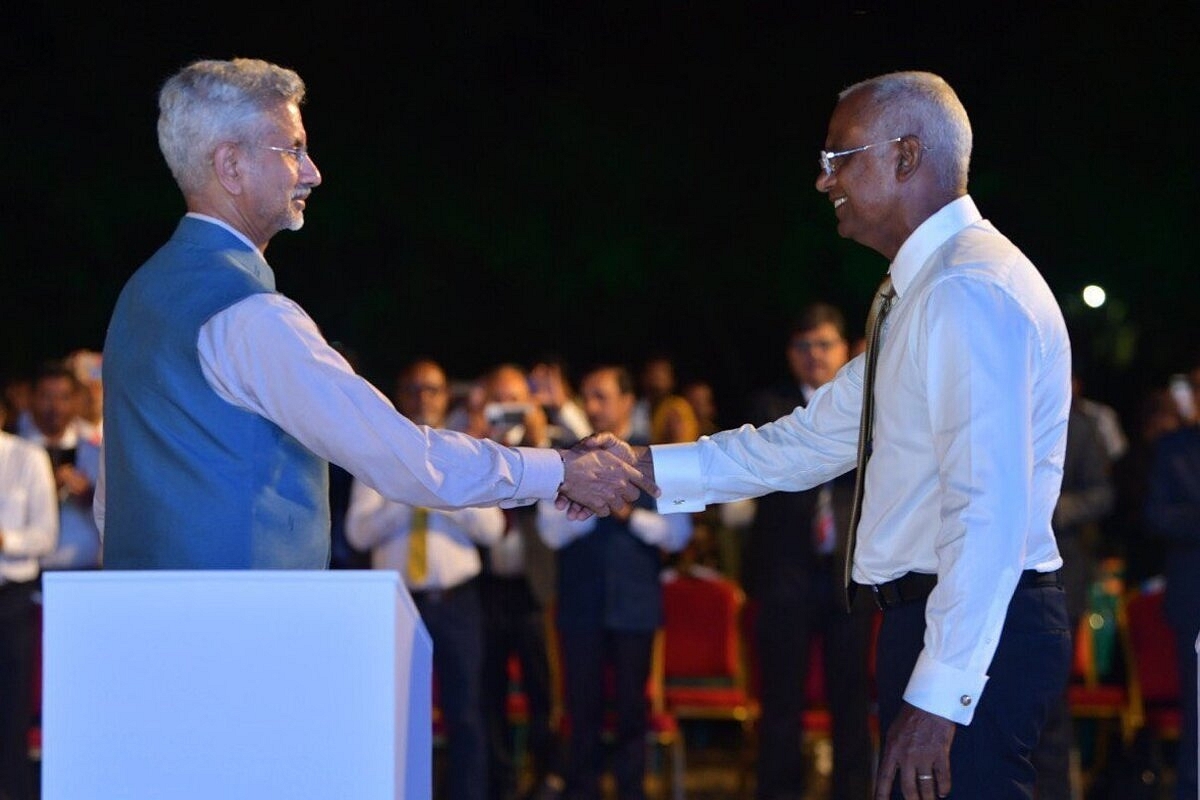News Brief
China Outmaneuvered In The Maldives As Construction Of India-Funded Airport Begins On Strategic Island

External Affairs Minister S Jaishankar with Maldives President Ibrahim Mohamed Solih.
External Affairs Minister S Jaishankar was in the Maldives this week for the groundbreaking ceremony of the Hanimaadhoo international airport project. The $136.6 million development of the Hanimadhoo airport is being executed by Indian company JMC Projects Ltd, financed through a line of credit from India's Exim Bank.
The project includes the construction of a 2.46-km runway that can accommodate larger aircraft and a terminal with an annual capacity for 1.3 million passengers. This airport project is aimed to increase tourism in the northern regions of the Maldives, which is the country's primary source of income.
This is the second-largest infrastructure project that India has undertaken in the Maldives in recent months, following the $500 million Greater Male Connectivity project, which connects the Maldives capital to three neighboring highlands with a 6.74-km bridge and causeway over the sea.
India has replaced China as the primary source of financing and support for infrastructure projects in the Maldives. This shift reflects the Maldives' increasing reliance on India as a strategic partner.
India has had a long-standing relationship with the Maldives, and has traditionally been considered the regional power in South Asia. In recent years, China has been increasing its presence and influence in the region through its Belt and Road Initiative, which includes investment in infrastructure projects in the Maldives.
Abdulla Yameen, who was in power in the Maldives from 2013 to 2018, had a pro-China tilt and pursued close ties with China.
He welcomed Chinese investment in the Maldives and signed several agreements with China for infrastructure development projects, including the construction of a new airport and a bridge connecting the capital city of Male to the nearby island of Hulhule.
During Yameen's presidency, relations between the Maldives and India became strained due to his pro-China stance and his crackdown on the opposition. In the lead up to the 2018 presidential elections, India took a strong stance against Yameen's crackdown on the opposition.
At one point, there were reports that India was considering the possibility of a military intervention to remove Yameen from power if the political crisis in the Maldives escalated.
After the 2018, Maldives faced a political crisis with President Abdulla Yameen refusing to accept the results of the presidential election. India, along with other countries, called for the respect of democratic processes, and the new President Ibrahim Mohamed Solih, who was supported by India, assumed office in November 2018.
After that, India has been closely working with the Maldives and the new government has been working to strengthen its ties with India and reduce its dependence on China. India has also provided financial assistance to the Maldives and has signed several agreements to enhance cooperation in areas such as security, defense, and infrastructure development.
India's diplomatic efforts helped to prevent Maldives from completely falling into China's sphere of influence, and allowed India to retain its traditional role as the dominant regional power.
However, Yameen and his party, now out of power for nearly five years, have been promoting Chinese interests and running an anti-India campaign called "India out", claiming that the MDP government has allowed Indian troops to be stationed on Maldivian soil.
Yameen is currently serving an 11-year prison sentence after being convicted on charges of money laundering and bribery late last year.
Support Swarajya's 50 Ground Reports Project & Sponsor A Story
Every general election Swarajya does a 50 ground reports project.
Aimed only at serious readers and those who appreciate the nuances of political undercurrents, the project provides a sense of India's electoral landscape. As you know, these reports are produced after considerable investment of travel, time and effort on the ground.
This time too we've kicked off the project in style and have covered over 30 constituencies already. If you're someone who appreciates such work and have enjoyed our coverage please consider sponsoring a ground report for just Rs 2999 to Rs 19,999 - it goes a long way in helping us produce more quality reportage.
You can also back this project by becoming a subscriber for as little as Rs 999 - so do click on this links and choose a plan that suits you and back us.
Click below to contribute.
Latest